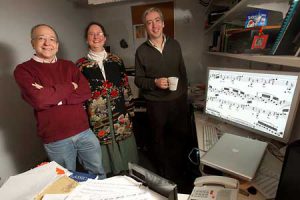
By Chris Chipello
Musicologists tend to be as floridly impressionistic as food critics. The famous 20th-century scholar Edward Lowinsky, for example, compared the styles of Renaissance composers Nicolas Gombert and Orlando di Lasso in these terms: “In Lasso’s sound world a sense of gravity prevails. Whether the harmonies rest, stride onwards, or flow, one has the impression that they are on firm ground, whereas Gombert’s seem to float weightlessly.”
Just as technical innovations have enabled molecular gastronomists to shed scientific light on the art of cooking, however, the recent development of digital tools for searching musical scores is opening the way to dissect and analyze large bodies of music based on objective evidence. And scholars at McGill’s Schulich School of Music are poised to explore the cutting edge of this new research frontier.
An international team led by Julie Cumming, Associate Dean at the Schulich School, was named earlier this month as one of 14 winners of the second Digging into Data Challenge. The competition, sponsored by funding agencies from Canada, the U.S., the United Kingdom and the Netherlands, provides grants to promote innovative humanities and social-science research using large-scale data analysis.
The international competition also highlights how computational techniques can be used to change the nature of humanities research – an emerging field that is spawning an array of collaborations across McGill.
For the Challenge, the team will use computers to examine the fundamental language of polyphonic Western classical music and how it changed between 1300 and 1900.
The work builds on recent changes in the way music is copied, stored and disseminated. While traditional musical scores aren’t searchable by computers, most music is now copied in computer formats, known as symbolic notation. Sophisticated software that can do nuanced queries of symbolic notation is also used.
The project – known as ELVIS (short for Electronic Locator of Vertical Interval Successions) – is inspired by so-called corpus research in linguistics, which involves taking large bodies of text and counting the frequency of words and recurring groups of words. The ELVIS researchers propose that the musical unit analogous to a word in polyphonic music is a succession of two vertical intervals, or chords.
By finding the most common successions, and chains of successions, in large bodies of music, they aim to rigorously describe changes in style over time, to discover what is specific to individual composers and to gain new insight into the nature of music.
The project team includes musicologists, music theorists, computer experts and a librarian; six of the members are from McGill, one from the Massachusetts Institute of Technology, one from Yale University, and two from the University of Aberdeen.
“For the first time we have large bodies of music in symbolic notation, search tools with which to query that music, and a team of scholars with massive musical and technical expertise,” said Cumming. “The combination will allow us to conduct fundamentally new evidence-based research into what polyphonic music is, how it works, and how it changes.”
In the first round (2009) of the Challenge, the eight winning projects included one led by Ichiro Fujinaga, also of the School of Music. Fujinaga, a leading expert in music information retrieval, is a member of Cumming’s team on the new project.
Other McGill participants are Peter Schubert, a music theorist who has worked with Cumming since the 1990s on style change in the Renaissance; René Rusch, an expert on 19th-century music; Jonathan Wild, a music theorist with expertise in mathematical modeling; and music librarian Cynthia Leive.
Total project funding for the second round of the Challenge is about US$4.8 million. The Social Sciences and Humanities Research Council of Canada is contributing CAN$869,117, which will support Canadian researchers from eight of the 14 winning teams.
For more information about the competition: www.diggingintodata.org
